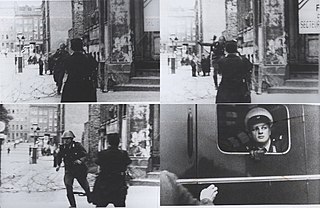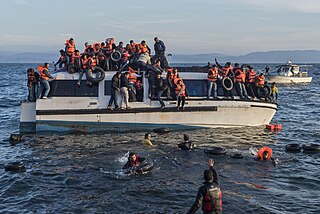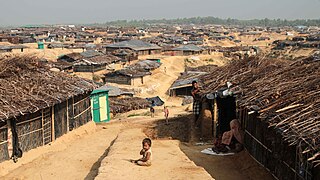
A refugee, conventionally speaking, is a person who has lost the protection of their country of origin and who cannot or is unwilling to return there due to well-founded fear of persecution. Such a person may be called an asylum seeker until granted refugee status by the contracting state or the United Nations High Commissioner for Refugees (UNHCR) if they formally make a claim for asylum.

The International Rescue Committee (IRC) is a global humanitarian aid, relief, and development nongovernmental organization. Founded in 1933 as the International Relief Association, at the request of Albert Einstein, and changing its name in 1942 after amalgamating with the similar Emergency Rescue Committee, the IRC provides emergency aid and long-term assistance to refugees and those displaced by war, persecution, or natural disaster. The IRC is currently working in about 40 countries and 26 U.S. cities where it resettles refugees and helps them become self-sufficient. It focuses mainly on health, education, economic wellbeing, power, and safety.

An internally displaced person (IDP) is someone who is forced to leave their home but who remains within their country's borders. They are often referred to as refugees, although they do not fall within the legal definitions of a refugee.

Forced displacement is an involuntary or coerced movement of a person or people away from their home or home region. The UNHCR defines 'forced displacement' as follows: displaced "as a result of persecution, conflict, generalized violence or human rights violations".
Sexual violence is any harmful or unwanted sexual act or attempt to obtain a sexual act by violence or coercion, act to traffic a person, regardless of the relationship to the victim. This includes forced engagement in sexual acts, attempted or completed acts and occurs without the consent of the victim. It occurs in times of peace and armed conflict situations, is widespread, and is considered to be one of the most traumatic, pervasive, and most common human rights violations.

Human rights in Brazil include the right to life and freedom of speech; and condemnation of slavery and torture. The nation ratified the American Convention on Human Rights. The 2017 Freedom in the World report by Freedom House gives Brazil a score of "2" for both political rights and civil liberties; "1" represents the most free, and "7", the least.

The International Catholic Migration Commission (ICMC) is an international organization that serves and protects uprooted people, including migrants, refugees, and internally displaced people, regardless of faith, race, ethnicity or nationality. With staff and programs in over 40 countries, ICMC advocates for sustainable solutions and rights-based policies directly and through a worldwide network of 132 member organizations.
Prostitution in Colombia is legal, regulated and limited to brothels in designated "tolerance zones". Sex workers are required to have regular health checks. However, the laws are rarely applied and prostitution is widespread, partly due to poverty and internal displacement.

The Democratic Republic of the Congo, and the east of the country in particular, has been described as the "Rape Capital of the World", and the prevalence and intensity of all forms of sexual violence has been described as the worst in the world. Human Rights Watch defines sexual violence as "an act of a sexual nature by force, or by threat of force or coercion", and rape as "a form of sexual violence during which the body of a person is invaded, resulting in penetration, however slight, of any part of the body of the victim, with a sexual organ, or of the anal or genital opening of the victim with any object or other part of the body."

Refugee women face gender-specific challenges in navigating daily life at every stage of their migration experience. Common challenges for all refugee women, regardless of other demographic data, are access to healthcare and physical abuse and instances of discrimination, sexual violence, and human trafficking are the most common ones. But even if women don't become victims of such actions, they often face abuse and disregard for their specific needs and experiences, which leads to complex consequences including demoralization, stigmatization, and mental and physical health decay. The lack of access to appropriate resources from international humanitarian aid organizations is compounded by the prevailing gender assumptions around the world, though recent shifts in gender mainstreaming are aiming to combat these commonalities.
The Democratic Republic of the Congo (DRC) is a source and destination country for men, women, and children subjected to trafficking in persons, specifically conditions of forced labor and forced prostitution. The majority of this trafficking is internal, and much of it is perpetrated by armed groups and government forces outside government control within the DRC's unstable eastern provinces.
By January 2011 the United Nations High Commissioner for Refugees (UNHCR) estimated that there are 262,900 Sudanese refugees in Chad. The majority of them left Sudan escaping from the violence of the ongoing Darfur crisis, which began in 2003. UNHCR has given the Sudanese refugees shelter in 12 different camps situated along the Chad–Sudan border. The most pressing issues UNHCR has to deal with in the refugee camps in Chad are related to insecurity in the camps,, malnutrition, access to water, HIV and AIDS, and education.
Refugees in Jordan rose with the uprising against the Syrian government and its President Bashar al-Assad. Close to 13,000 Syrians per day began pouring into Jordan to reside in its refugee camps.
A refugee crisis can refer to difficulties and dangerous situations in the reception of large groups of forcibly displaced persons. These could be either internally displaced, refugees, asylum seekers or any other huge groups of migrants.

Rohingya refugees in Bangladesh mostly refer to Forcibly Displaced Myanmar Nationals from Myanmar who are living in Bangladesh. The Rohingya people have experienced ethnic and religious persecution in Myanmar for decades. Hundreds of thousands have fled to other countries in Southeast Asia, including Malaysia, Indonesia, and Philippines. The majority have escaped to Bangladesh, where there are two official, registered refugee camps. Recently violence in Myanmar has escalated, so the number of refugees in Bangladesh has increased rapidly. According to the UN Refugee Agency (UNHCR), more than 723,000 Rohingya have fled to Bangladesh since 25 August 2017.
Dr. Akio Kanai is the CEO of Fuji Optical in Hokkaido Japan, and the recipient of the 2006 Nansen Refugee Award.

Since the onset of the Syrian Civil War in March 2011, over 1.5 million Syrian refugees have fled to Lebanon, and constitute nearly one-fourth of the Lebanese population today. Lebanon currently holds the largest refugee population per capita in the world.

Human rights in Suriname are currently recognised under the Constitution of the Republic of Suriname of 1987. Suriname is a constitutional democracy with a president elected by the unicameral National Assembly. The National Assembly underwent elections in 2020, electing Chan Santokhi as president. The National Assembly has a commission pertaining to issues regarding the country's human rights. The Human Rights Office of the Ministry of Justice and Police is responsible for advising the government on regional and international proceedings against the state concerning human rights. Human rights in Suriname is periodically reviewed by the United Nations Human Rights Committee (UNHRC), on which it is often believed the level of human rights do not yet meet international standards.
Sabuni Francoise Chikunda is a Congolese torture survivor, refugee, activist, teacher, and organisation founder, based in Uganda. She was the Africa regional winner of the Nansen Refugee Award in 2020.











